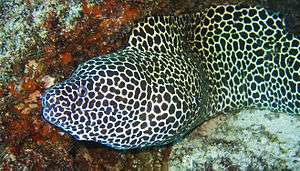Laced moray
| Laced moray | |
|---|---|
 | |
| Scientific classification | |
| Kingdom: | Animalia |
| Phylum: | Chordata |
| Class: | Actinopterygii |
| Order: | Anguilliformes |
| Family: | Muraenidae |
| Genus: | Gymnothorax |
| Species: | G. favagineus |
| Binomial name | |
| Gymnothorax favagineus Bloch & J. G. Schneider, 1801 | |
The laced moray (Gymnothorax favagineus) also known as the leopard moray, tessellate moray or honeycomb moray, is a species of marine fish in the family Muraenidae.
Description
Gymnothorax favagineus is a large moray which can reach a maximum length of 300 cm, but specimens usually encountered are much smaller.[1] Its serpentine in shape body has a white to yellowish background color dotted with numerous black spots which latter vary in size and shape depending on the individual and on the environment in which the animals live.[2] Therefore, morays living on a reef with clear water will have less black spots than those of a turbid environment.[3] It is from this characteristic color pattern that ensue its vernacular names.
Distribution & habitat
The laced moray is widespread throughout the Indo-West Pacific area from eastern coast of Africa, Red Sea included, until Papua New Guinea and from south Japan to the Great Barrier Reef.[4][5]
It lives on the outer slopes of coral reefs. During the day, it sits sheltered in crevices between 3.3 and 148.5 feet (1 and 45 meters) deep.[6]
Biology
The laced moray is carnivorous, it leaves its lair at night to actively hunt its preys along the reef. It feeds mainly on small fish and cephalopods.[7] Large adults are prone to be aggressive in the wild.[8]
References
- ↑ Lieske, E. and R. Myers, 1994. Collins Pocket Guide. Coral reef fishes. Indo-Pacific & Caribbean including the Red Sea. Haper Collins Publishers, 400 p.
- ↑ Kuiter, R.H., 1998. Photo guide to fishes of the Maldives. Atoll Editions, Victoria, Australia. 257 p.
- ↑ Kuiter, R.H. and T. Tonozuka, 2001. Pictorial guide to Indonesian reef fishes. Part 1. Eels- Snappers, Muraenidae - Lutjanidae. Zoonetics, Australia. 302 p.
- ↑ Fricke, R., 1999. Fishes of the Mascarene Islands (Réunion, Mauritius, Rodriguez): an annotated checklist, with descriptions of new species. Koeltz Scientific Books, Koenigstein, Theses Zoologicae, Vol. 31:759 p.
- ↑ Lieske, E. and R. Myers, 1994. Collins Pocket Guide. Coral reef fishes. Indo-Pacific & Caribbean including the Red Sea. Haper Collins Publishers, 400 p.
- ↑ http://doris.ffessm.fr/fiche2.asp?fiche_numero=1567
- ↑ Sommer, C., W. Schneider and J.-M. Poutiers, 1996. FAO species identification field guide for fishery purposes. The living marine resources of Somalia. FAO, Rome. 376 p.
- ↑ Lieske, E. and R. Myers, 1994. Collins Pocket Guide. Coral reef fishes. Indo-Pacific & Caribbean including the Red Sea. Haper Collins Publishers, 400 p.
| Wikimedia Commons has media related to Gymnothorax favagineus. |
| Wikispecies has information related to: Gymnothorax favagineus |
External links
- http://www.marinespecies.org/aphia.php?p=taxdetails&id=217509
- http://www.fishbase.org/Summary/SpeciesSummary.php?ID=5391&AT=Kalu+iriya
- "Gymnothorax favagineus". Integrated Taxonomic Information System. Retrieved 13 January 2015.
- Froese, Rainer and Pauly, Daniel, eds. (2006). "Gymnothorax favagineus" in FishBase. April 2006 version.